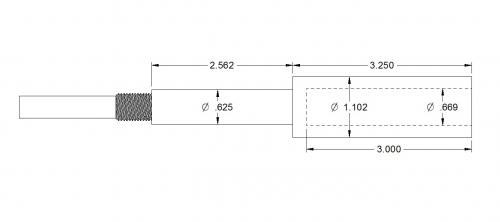Posts: 3,798
Threads: 184
Joined: Jun 2012
Location: Farmington Hills, Michigan
I use that technique quite a lot Ken and it works well. You are correct though, it does require a close fit on the bore, which is pretty easy with the reamed part as a gauge. I would personally bore and turn that end in the same set-up and then flip and indicate for the other end, but Ed stated that he wanted to use a reamer it so making a stub arbor or pressing a mandrel in the bore would be the best option.
Tom
Posts: 716
Threads: 32
Joined: Apr 2012
Location: Washington, USA
04-17-2014, 08:17 AM
(This post was last modified: 04-17-2014, 08:21 AM by Sunset Machine.)
I'm making something similar myself using a chuck table. The table is threaded 3/8" x 16 clear though, it's a 2" dia chunk of CRS just a tad shorter (1/4") than the chuck jaws. One end is bored out a little to clear the hole in the adapter I'm making. It'll come within .002" pretty easily using a 3-jaw (I just checked - faces parallel within a few tenths, diameters concentric within .0015". No dial indicator was used in the setup).
The details:
There's a bit of allthread though the headstock. A nut & washer on the outboard end, the table is loosely secured by the chuck jaws and the allthread drawbar tightened up good. Now you have a flat surface just shy of the jaw tips. Open up the chuck and in goes my adapter-to-be with its pre-drilled bore. A short bolt through the adapter secures it flat to the chuck table and the jaws snugged up. Remove the bolt.
The part is faced, flipped, bolted, mounted, unbolted, faced again and bored. The bolt re-inserted, tightened, chuck jaws loosened and drawbar removed. The chuck table with the adapter attached is pulled out of the jaws until the part is clear, and then the jaws are wound down around the body of the chuck table. The part OD is then turned. Done.
Handy for making precision washers/spacers/etc.
Posts: 8,860
Threads: 319
Joined: Feb 2012
Location: Arizona/Minnesota
(04-16-2014, 07:23 PM)f350ca Wrote: ...
Or drill and ream then turn a shaft to fit the reamed hole and use it as an arbour to do the rest of the machining.
This was my thought also.
Ed









![[Image: TomsTechLogo-Profile.png]](http://tomstechniques.com/wp-content/uploads/2013/11/TomsTechLogo-Profile.png)